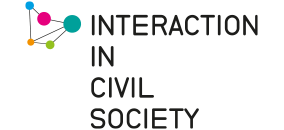Interaction in Civil Society –
Our Research Agenda
Our research takes a close look at the relationship between civil society and social cohesion. How, and under what conditions, do civil society actors engage in interactions that foster or break cohesion? Our aim is to understand social cohesion as driven by, and constantly negotiated through the specific dynamics of social interaction.
Our team will develop and test a new conflict and interaction-based perspective on social cohesion in contemporary society, using perspectives from the social sciences, the humanities, and computer science, as well as from partners in civil society and politics.
The Berlin University Alliance Exploration Project consists of four key research units that focus on the mapping and monitoring of civil society, its discourses, constituent individuals, and mundane social encounters.
Research units
Mapping Civil Society Initiatives
This research unit provides an inventory of civil society initiatives that have been active, activated, or deactivated during the COVID-19 pandemic and its aftermath. The key ambition is to systematically cover formal and informal as well as political and non-political organizations.
How was civil society affected by the pandemic and the measures taken against it? Which organizations and initiatives were active and how? What are their organizational and ideational characteristics?
Discourses of Cohesion
What answers do civil society actors (implicitly and explicitly) give on who should be held together, to what extent, and how? What are the central structural and procedural characteristics of civil society communication in relation to social cohesion?
This research unit investigates how social cohesion is negotiated and constituted in different discourses in civil society. For this purpose, interactions and relationships between civil society actors as well as their communication with the public are examined. The focus is therefore on the online and offline communication of selected civil society organizations in discourses that negotiate issues of community and cohesion.
Subjects of Cohesion
Who participates in which forms of civic engagement and in which societal fields? Who withholds engagement? How does engagement affect social cohesion?
This research unit aims at achieving a comprehensive understanding of both the individual subjects that constitute civil society initiatives (members and supporters) and the adversaries and bystanders.
Encounters of Cohesion
How do civil society initiatives promote or disrupt cohesion at the level of individuals and their situated encounters and social interactions? Although a collective property, cohesion is firmly rooted in these micro-social relations, in dyads (couples, friends, acquaintances, etc.) as well as in small-groups, like families, work teams, or close-knit on- and offline communities.
The goal of this research unit is, to understand how situated encounters, as in social exchange, debate, and negotiation, promote or disrupt behavioral dimensions of social cohesion, for example empathic concern, joint attention, behavioral synchrony and shared intentions.

